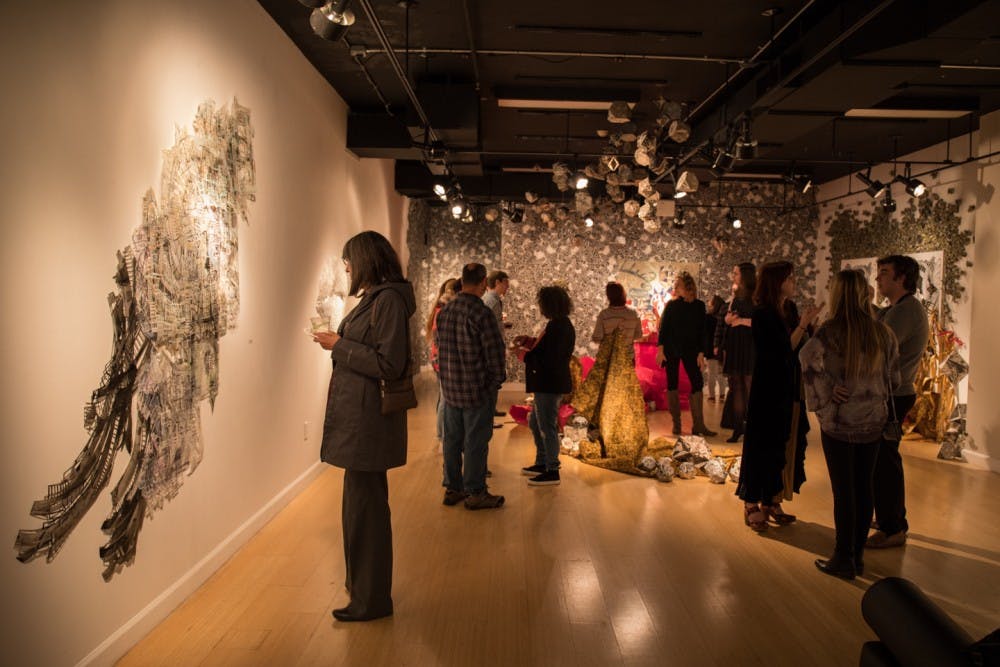Bumblebees, cancer and political chaos might appear to be unrelated, but to artists Jodi Lightner and Adrian Rhodes, all demonstrate a dominant theme in life. And although the theme is sometimes depressing, the "Framing Interference" exhibition currently on display at the McMaster Gallery in the School of Visual Art and Design shows it through the use of the artists' vibrant and dazzlingly colorful artwork.
Through Dec. 13, "Framing Interference" will give students a chance to see the works of Jodi LIghtner and Adrian Rhodes, two highly celebrated artists who passed a careful selection process for their art to be displayed.
"It's pretty hard to get here ... if you are selected as one of 100, that speaks for itself," said gallery director Olga Yukhno. "So, I would really really encourage students to come."
Lightner, an associate professor of art at Montana State University Billings, uses her work to comment on the deconstruction of life's structures and the revelation one might have after a long-standing system is analyzed. Most of her pieces also have political undertones.
"I always want to have things have multiple ways to be interpreted and meant so that it relates to current events," Lightner said. "Layers are really important to me ... and, hopefully, a revelation that slowly reveals itself and is not just going to hit you in the face."
Layers are also Lightner's artistic style. Believing that structures should be broken, she draws from her reputation as a rule-breaker and her childhood in tornado alley to create visual chaos. Another source of inspiration is literature. In fact, one of her most unique inspirations comes from the Italian novel, "Invisible Cities" by Italo Calvino.
"It is a conversation between Marco Polo and the great Kublai Kahn," Lightner said. "Marco Polo is explaining his travels ... and it really explains, maybe, how the structures are being influenced by the community."
Rhodes also uses layers as her theme, but she draws upon personal tragedy as an inspiration for her work. After losing her mother before the birth of her two young daughters, Rhodes began to see her mother's face when looking at her children, leading to her fascination with matrilineal connections.
"There is a strong matriline in my family, and I find myself at the head. I feel like I am too young for this, but it is a fact of my existence," Rhodes said.
Soon after the birth of her youngest daughter, another tragedy struck. This time it was Rhodes's undergraduate mentor, who helped her learn how to think like an artist and inspired her in many ways. Then last January, despite her endless pleas for him to see someone concerning his cough, Rhodes's father died after his cancer diagnosis, leaving her children without grandparents.
"I have this vibrant, beautiful existence that has been interrupted by the 2 a.m. phone call," Rhodes said. "You find this new normal, and that is the interference with which I am dealing in my own work."
Rhodes uses this interference and repetitive tragedy as a catalyst for her work. This is most apparent in one specific piece of hers, which is comprised of an obsessive amount of identical bee drawings that envelope the gallery wall.
Both Lightner and Rhodes start heavy conversations with their work, but unique presentations of timely issues is par for the course at the McMaster Gallery. The last show in the space was a commentary on GMO foods and environmental issues with artwork made using robotics and fake plants. This show has a different vibe, but the outcome is the same.
"We try to bring a lot of relevant things," Yukhno said. "Because our gallery does not have to worry about selling work, we can afford to bring something that poses philosophical questions, questions that make us think."
Yukhno hopes to continue McMaster Gallery's tradition of bringing artists that ask questions and are willing to provide guidance and constructive criticism to student artists.
"It gives the students an opportunity to see, because the installation is phenomenal, to see what they can do and maybe have a good example," Yukhno said. "The art we are able to bring is of very, very high quality and I think apart from setting and bringing up important goals and issues ... it also I think sets very high standards."
"Framing Interference" will be open to the public at McMaster Gallery every Monday through Friday from 9:30 a.m. to 4 p.m. until Dec. 13.

